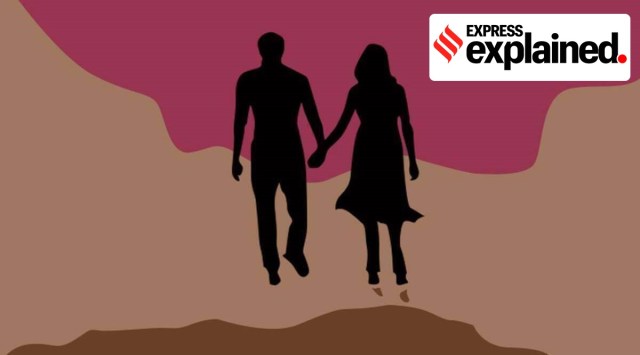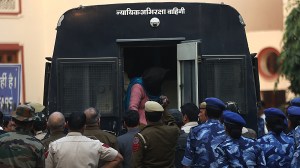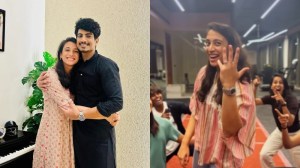SC will hear challenge to HC’s leash on MP anti-conversion law: what is the issue, what did HC say?
The HC in November last year restrained the state govt from prosecuting “adult citizens if they solemnise marriage on their own volition” and violate Section 10 of the Madhya Pradesh Freedom of Religion Act (MPFRA), 2021.
 Section 5 of the MPFRA, 2021 prohibits unlawful conversion from one religion to another by use of misrepresentation, force, undue influence, coercion, any other fraudulent means, allurement, or promise of marriage. (Representational/File)
Section 5 of the MPFRA, 2021 prohibits unlawful conversion from one religion to another by use of misrepresentation, force, undue influence, coercion, any other fraudulent means, allurement, or promise of marriage. (Representational/File) The Supreme Court on Tuesday (January 3) agreed to hear the Madhya Pradesh government’s challenge to a High Court order restraining it from prosecuting interfaith couples who get married without first informing the district magistrate, PTI reported.
A Bench of Justices M R Shah and C T Ravikumar issued notice in the matter and posted it for hearing on February 7.
What was the ruling of the Madhya Pradesh High Court?
In a decision that provided relief to interfaith couples seeking to marry, the Madhya Pradesh High Court in November last year restrained the state government from prosecuting “adult citizens if they solemnise marriage on their own volition” and violate Section 10 of the Madhya Pradesh Freedom of Religion Act (MPFRA), 2021.
Soon afterward, Advocate General Prashant Singh had said that the state would challenge the High Court’s order in the Supreme Court “shortly”.
Under what circumstances was the MPFRA enacted?
After Kamal Nath’s Congress government was toppled and the BJP’s Shivraj Singh Chouhan returned as Chief Minister in March 2020, the state government announced its intention to curb religious conversions that were carried out solely for the purpose of marriage.
On December 28, 2020, a special meeting of the state Cabinet cleared the Madhya Pradesh Dharma Swatantrata Adhiniyam, 2020, a proposed law to tighten restrictions on religious conversions.
The new law was intended to replace the existing Madhya Pradesh Dharma Swatantrya Adhiniyam, 1968. The 1968 law had faced a challenge in the High Court, but it had been upheld by the Supreme Court in 1977.
An Ordinance was promulgated on January 7, 2021 and, two months later on March 8, 2021, the Madhya Pradesh Freedom of Religion Act, 2021 was passed by voice vote amid slogans of Jai Shri Ram in the state Assembly.
With the passage of the Act, Madhya Pradesh became the third BJP-ruled state after Himachal Pradesh and Uttar Pradesh to bring a law to punish religious conversions for marriage.
What are the main provisions of the MPFRA, 2021?
Section 5 of the MPFRA, 2021 prohibits unlawful conversion from one religion to another by use of misrepresentation, force, undue influence, coercion, any other fraudulent means, allurement, or promise of marriage.
Violators face between one year and five years of imprisonment. If the person who is converted is a child, a woman, or a person belonging to a Scheduled Tribe or Scheduled Caste, the punishment varies from two years to 10 years, with a fine of 50,000. The punishment for mass conversions is five to 10 years in prison, with a penalty of Rs 1 lakh.
Cases under the Act are cognizable (which means an arrest can be made without a warrant) and non-bailable. Complaints can be registered by the victim, the victim’s parents or siblings, or anyone else including a guardian with permission from the local court. The complaint will be investigated by a police officer of the rank of sub-inspector and above.
And what is Section 10 of the Act that the HC intervened in?
This section requires individuals who are intending to convert, and the priest who would carry out the conversion, to notify the district magistrate of their intention 60 days in advance.
Under Section 10, for a religious conversion to be valid, the law requires a 60-day prior “declaration of the intention to convert” to the district magistrate by the individual as well as the priest carrying out the conversion. It is only after this, that a couple from different religions can be legally married.
Failure to notify the state of the intent to convert will render the wedding null and void, and an individual can be prosecuted for fraudulent conversion on promise of marriage. A priest who fails to notify the government can be punished with imprisonment from three to five years and a minimum fine of Rs 50,000.
What did the High Court say in its order in November 2022?
The order passed by Justices Sujoy Paul and Prakash Chandra Gupta of the Jabalpur Bench of the Madhya Pradesh High Court found Section 10 of the MPFRA prima facie unconstitutional.
The court said: “Section 10 makes it obligatory for a citizen desiring conversion to give a declaration in this regard to the District Magistrate which in our opinion ex facie, unconstitutional in the teeth of aforesaid judgments of this Court. Thus, till further orders, respondent shall not prosecute the adult citizens if they solemnize marriage on their own volition and shall not take coercive action for violation of Section 10 of Act of 21.”
The order was similar to the one passed in August 2021 by a division Bench of the Gujarat High Court. Then Chief Justice Vikram Nath and Justice Biren Vaishnav had stayed several provisions of The Gujarat Freedom of Religion (Amendment) Act, 2021, including those pertaining to prior permission from district magistrates, punishment for marriage by unlawful conversions, etc.
The Gujarat law, which amended an earlier 2003 law pertaining to punishment for forcible conversions, was notified on June 15, 2021. The Gujarat HC Bench observed that certain sections of the law “interferes with the intricacies of marriage including the right to the choice of an individual, thereby infringing Article 21 of the Constitution of India”.
How many cases have been registered under the MP law so far?
The purpose of the law was to prevent or discourage forcible or fraudulent religious conversions with the promise of marriage, something that Hindutva groups often refer to as “love jihad”. Home Minister Narottam Mishra had informed the state Assembly that between the time the ordinance came into effect and the passage of the Act on March 7, 2021, at least 16 cases had been registered for alleged violation of the provisions of the law. By the end of December 2021, 68 cases had been registered under the Act across the state.
An investigation published by The Indian Express in March 2021 showed that in at least 11 of the 21 cases registered (against 47 individuals) under the anti-conversion law until then, the women who registered the complaints knew the accused — they were friends, in a relationship, and in one case, married for over five years.
In at least four cases, the couple had eloped and returned before the women involved approached the police. Three other cases were lodged after the intervention of Hindutva groups. The remaining six cases were filed against alleged Christian missionaries “trying to lure villagers” to convert.



- 01
- 02
- 03
- 04
- 05



































